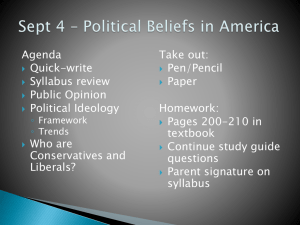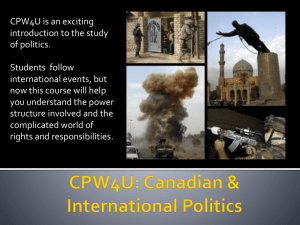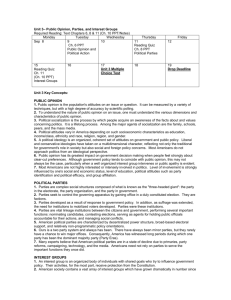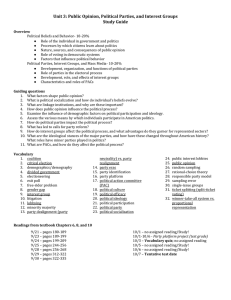Political Party Syllabus: Academic Chapters in textbook 11/4: 11/4 – 12/19
advertisement
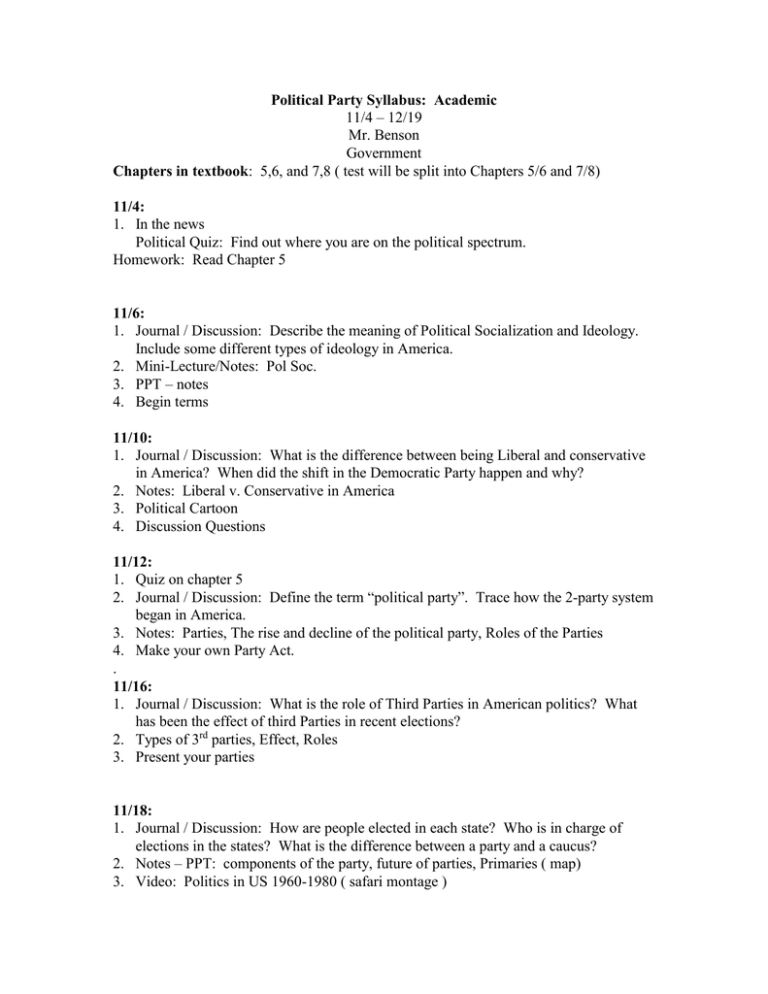
Political Party Syllabus: Academic 11/4 – 12/19 Mr. Benson Government Chapters in textbook: 5,6, and 7,8 ( test will be split into Chapters 5/6 and 7/8) 11/4: 1. In the news Political Quiz: Find out where you are on the political spectrum. Homework: Read Chapter 5 11/6: 1. Journal / Discussion: Describe the meaning of Political Socialization and Ideology. Include some different types of ideology in America. 2. Mini-Lecture/Notes: Pol Soc. 3. PPT – notes 4. Begin terms 11/10: 1. Journal / Discussion: What is the difference between being Liberal and conservative in America? When did the shift in the Democratic Party happen and why? 2. Notes: Liberal v. Conservative in America 3. Political Cartoon 4. Discussion Questions 11/12: 1. Quiz on chapter 5 2. Journal / Discussion: Define the term “political party”. Trace how the 2-party system began in America. 3. Notes: Parties, The rise and decline of the political party, Roles of the Parties 4. Make your own Party Act. . 11/16: 1. Journal / Discussion: What is the role of Third Parties in American politics? What has been the effect of third Parties in recent elections? 2. Types of 3rd parties, Effect, Roles 3. Present your parties 11/18: 1. Journal / Discussion: How are people elected in each state? Who is in charge of elections in the states? What is the difference between a party and a caucus? 2. Notes – PPT: components of the party, future of parties, Primaries ( map) 3. Video: Politics in US 1960-1980 ( safari montage ) 11/20: 1. Journal / Discussion: How can one run for office? What does one need to run? How do they raise the $ to run? 2. Notes: Camp. Fin., loopholes, PACs 3. Campaign Finance 4. Begin The Candidate 11/ 24: Finish The Candidate 12/1: 1. Review Chapters 5 and 6 12/3: Test on Chapters 5 and 6 12/7: 1. Journal / Discussion: What is Public Opinion? Why does it matter so much in politics? 2. PPT: Polls, analyzing polls, Bias 3. Journalism in America 4. Living Room Campaign ( internet site ) 5. Chapter 7 and 8 Terms 12/9: 1. Journal / Discussion: what is the role of mass media in politics? Do they have an unfair advantage in today’s political arena? 2. PPT: Role of Mass Media 3. Commercials in politics 4. Work on terms 12/11: 1. What are interest groups? What role do they play in American politics? 2. PPT: Nature of Int. groups, Role, Lobbying 3. Voting: amendments, stats Terms 12/15: 1. What are interest groups? What role do they play in American politics? 2. PPT: Nature of Int. groups, Role, Lobbying 3. Voting: amendments, stats 4. Review for Unit Test 12/17: Test on chapter 7 and 8 Terms DUE !!!!!!!!!! APG Term List for Unit II: 52 total: Please number them when completing. Conservative Gender gap John Q. Public Liberal Libertarians Middle America Partisanship Political elite Political machine Superdelegates Closed primary Office-bloc ballot Position issue Realignment Straight-ticket voting Interest group Public Interest Lobby Yellow Journalism Political ideology Populists Silent majority Activist Inactives Motor-Voter Bill Registered Voters Voting Rights Act (1965) Second party system Two-party system General election Open primary Presidential Primary Runoff primary Valence issue Lobby Adversarial press Caucus Direct primary Factional parties Ideological party Mugwumps National Committee One-issue Parties Plurality system Sponsored party Blanket primary Incumbent Political Action Committee Primary election Split-ticket voting Ideological interest group Pluralistic Political System Watchdog

